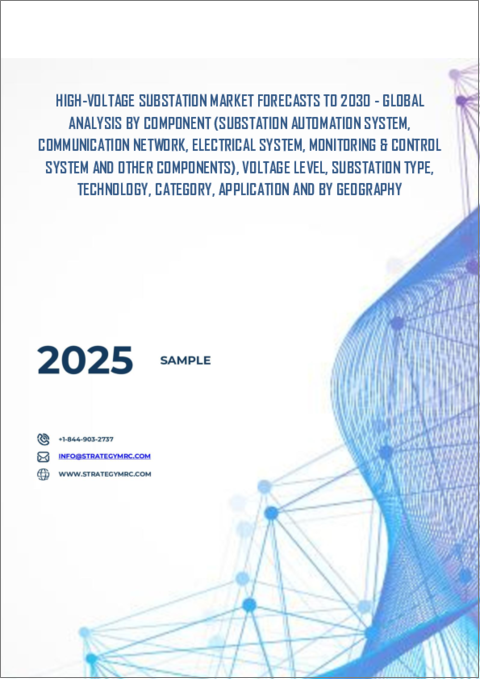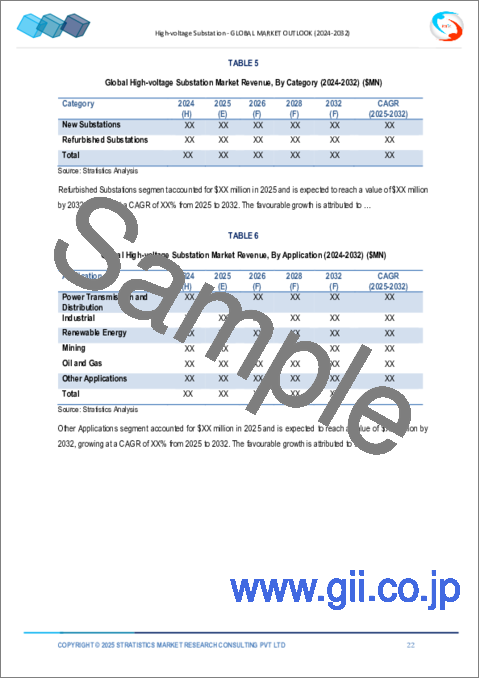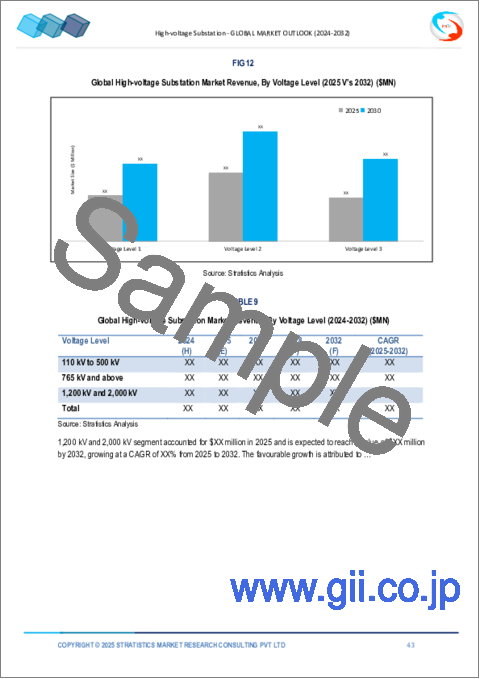|
|
市場調査レポート
商品コード
1577147
高電圧変電所市場の2030年までの予測:コンポーネント別、電圧レベル別、変電所タイプ別、技術別、カテゴリー別、用途別、地域別の世界分析High-voltage Substation Market Forecasts to 2030 - Global Analysis By Component, Voltage Level, Substation Type, Technology, Category, Application and by Geography |
||||||
カスタマイズ可能
|
|||||||
| 高電圧変電所市場の2030年までの予測:コンポーネント別、電圧レベル別、変電所タイプ別、技術別、カテゴリー別、用途別、地域別の世界分析 |
|
出版日: 2024年10月10日
発行: Stratistics Market Research Consulting
ページ情報: 英文 200+ Pages
納期: 2~3営業日
|
全表示
- 概要
- 図表
- 目次
Stratistics MRCによると、高電圧変電所の世界市場は2024年に369億3,000万米ドルを占め、2030年には480億9,000万米ドルに達すると予測され、予測期間中のCAGRは4.5%です。
電力システムの高電圧変電所は、生産者から消費者へのエネルギーの分配とトランスミッションを可能にする重要な部品です。これらの変電所は多くの重要な仕事をこなすが、主な仕事は高圧電力を配電に適した低電圧に変換することです。さらに、高電圧変電所では、効果的な長距離送電のために電圧を高める昇圧変圧器が一般的に利用され、一方、降圧変圧器は、家庭や企業を含むエンドユーザーに到達する前に電圧を下げるために使用されます。
国際エネルギー機関(IEA)によると、世界の電力需要は2040年まで年率2.7%の成長が見込まれています。
増大する電力消費
電力需要は、都市化、工業化、人口増加など多くの要因によって、世界中で急激に増加しています。エネルギー消費の集中は都市部に住む人々の数とともに高まり、効率的に電力を供給できる強力な電気インフラが必要となっています。さらに、産業が生産量を増やし、操業を拡大した結果、電力需要も増加しています。このような状況において、高電圧変電所は、大容量の電力を長距離にわたって無視できる損失で送電することを可能にするため、必要不可欠です。
過大な初期資本支出
電力会社や投資家は、多額の初期資本支出を必要とするため、高電圧変電所の設立や近代化を大きく躊躇する可能性があります。高度な技術、特殊な材料、厳しい安全規制が必要なため、高圧インフラの建設には多額の費用がかかります。例えば、変圧器、開閉装置、安全装置などのコストは非常に高くつく。特に資金の乏しい新興諸国では、多くの電力会社がこうしたプロジェクトに十分な資金を確保するのは難しいかもしれないです。さらに、このような金銭的な障害は、現在稼働中の変電所の近代化や拡張を妨げる可能性があり、最終的に市場全体の成長を妨げることになります。
スマートグリッドの導入
高電圧変電所市場は、スマートグリッド技術の採用により多くの機会を得ています。スマートグリッドは監視、制御、最適化機能を強化し、ユーティリティ企業が複雑なエネルギーシステムをより効果的に管理できるようにします。スマート技術に対応した高電圧変電所は、送電ロスを低減し、運用効率を高め、リアルタイムでのデータ分析を容易にし、より良い意思決定を行うことができます。さらに、電力会社がスマート・グリッド・ソリューションやデジタル変電所への投資を増やすにつれて、送電網の回復力と信頼性を向上させる最先端技術へのニーズが高まると思われます。
環境規制と社会的不評
高電圧変電所の運転と保守は、特に電磁界(EMF)暴露と事故の可能性に関連して、環境問題を引き起こす可能性があります。特に住宅地では、環境問題が広く知られるようになるにつれて、新しい変電所プロジェクトに対する市民の監視や反対が強まっています。規制の枠組みは、プロジェクトのスケジュールを遅らせたり、コストを増加させたりする厳しい環境アセスメントやコンプライアンス要件を課す可能性があります。さらに、こうした要素により、変電所の新設や既存施設の改修が困難になる可能性があり、最終的には市場の拡大の可能性が制限される可能性があります。
COVID-19の影響:
高電圧変電所市場はCOVID-19の大流行によって深刻な影響を受け、業界の他の分野でも大規模な混乱が生じた。封鎖措置や移動制限の実施により、労働力不足やサプライチェーンの混乱が多くのプロジェクトの棚上げを余儀なくされたため、プロジェクトの建設や配備に遅れが生じました。パンデミックによる景気後退の結果、商業・産業部門からの電力需要が減少し、新しい変電所の必要性が緩和されました。しかし、ワクチン接種の努力と景気回復により状況が徐々に改善したため、インフラ整備、特に再生可能エネルギーの統合と送電網の近代化に再び焦点が当てられています。
予測期間中は電気システム部門が最大になる見込み
高電圧変電所市場は、信頼性が高く効果的な配電へのニーズが高まっていることから、電気システム部門が大半を占めています。このセグメントには、変圧器、開閉装置、保護装置など、変電所が機能するために必要なさまざまな部品が含まれます。都市化、人口増加、効率改善と再生可能エネルギー源の統合を可能にするための老朽化した電気インフラの近代化が、このセグメントの成長を促進する主な要因です。さらに、この市場は、持続可能なインフラを支援する継続的な技術進歩や政府の取り組みにより、変化するエネルギー要件に適応しながらさらに成長する好位置にあります。
予測期間中、765kV以上のセグメントが最も高いCAGRが見込まれる
高電圧変電所市場では、765kV以上のセグメントのCAGRが最も高くなると予想されます。大規模な都市や産業施設の電力需要に対応できる大容量トランスミッションへのニーズが、この成長を後押ししています。再生可能エネルギー源の統合を促進し、送電網の信頼性を高めるため、各国が電気インフラの改善に取り組む中、765kV以上の電圧で動作する変電所の重要性が高まっています。さらに、これらの高電圧変電所は、遠方の再生可能エネルギー源を都市の消費センターに接続することを可能にし、送電損失を低減することで効果的な長距離送電を促進します。
最大のシェアを占める地域:
高電圧変電所市場はアジア太平洋地域が支配的です。急速な都市化、産業の成長、電気インフラを改善するための大規模な政府の取り組みが、この成長の主な原動力となっています。この拡大をリードしているのは中国やインドといった国々で、中でも中国は、その重要な都市化構想と高い再生可能エネルギー目標により、リードしています。最先端の高電圧変電所に対する需要は、中国政府が国内の送電網を近代化し、エネルギー損失を低減することを目的としたいくつかの政策を実施していることが原動力となっています。さらに、日本は送電網インフラの近代化と再生可能エネルギーの導入に力を入れており、この地域の市場環境は全体的に改善しています。
CAGRが最も高い地域:
インフラの老朽化と再生可能エネルギー源の統合が進んでいることから、高電圧変電所市場のCAGRは北米が最も高いと予想されます。この地域の最大市場である米国は、効率と信頼性を向上させるために送電網の更新に注力しています。さらに、配電の監視と制御を改善するスマートグリッド技術に焦点を当てた送電網拡張プロジェクトが大規模な投資を集めています。クリーンエネルギーへの取り組みとインフラ整備に対するカナダの強力な政府支援も、この成長に一役買っています。
無料のカスタマイズサービス:
本レポートをご購読のお客様には、以下の無料カスタマイズオプションのいずれかをご利用いただけます:
- 企業プロファイル
- 追加市場プレーヤーの包括的プロファイリング(3社まで)
- 主要企業のSWOT分析(3社まで)
- 地域セグメンテーション
- 顧客の関心に応じた主要国の市場推計・予測・CAGR(注:フィージビリティチェックによる)
- 競合ベンチマーキング
- 製品ポートフォリオ、地理的プレゼンス、戦略的提携に基づく主要企業のベンチマーキング
目次
第1章 エグゼクティブサマリー
第2章 序文
- 概要
- ステークホルダー
- 調査範囲
- 調査手法
- データマイニング
- データ分析
- データ検証
- 調査アプローチ
- 調査情報源
- 1次調査情報源
- 2次調査情報源
- 前提条件
第3章 市場動向分析
- 促進要因
- 抑制要因
- 機会
- 脅威
- 技術分析
- 用途分析
- 新興市場
- COVID-19の影響
第4章 ポーターのファイブフォース分析
- 供給企業の交渉力
- 買い手の交渉力
- 代替品の脅威
- 新規参入業者の脅威
- 競争企業間の敵対関係
第5章 世界の高電圧変電所市場:コンポーネント別
- 変電所自動化システム
- 通信ネットワーク
- 電気システム
- 監視制御システム
- その他のコンポーネント
第6章 世界の高電圧変電所市場:電圧レベル別
- 110kV~500kV
- 765 kV以上
- 1,200kVおよび2,000kV
第7章 世界の高電圧変電所市場:変電所タイプ別
- グリーンフィールド変電所
- ブラウンフィールド変電所
- ガス絶縁変電所(GIS)
- 空気絶縁変電所(AIS)
第8章 世界の高電圧変電所市場:技術別
- 従来型
- デジタル
第9章 世界の高電圧変電所市場:カテゴリー別
- 新しい変電所
- リファービッシュ変電所
第10章 世界の高電圧変電所市場:用途別
- 送電および配電
- 産業
- 再生可能エネルギー
- 鉱業
- 石油・ガス
- その他の用途
第11章 世界の高電圧変電所市場:地域別
- 北米
- 米国
- カナダ
- メキシコ
- 欧州
- ドイツ
- 英国
- イタリア
- フランス
- スペイン
- その他欧州
- アジア太平洋
- 日本
- 中国
- インド
- オーストラリア
- ニュージーランド
- 韓国
- その他アジア太平洋地域
- 南米
- アルゼンチン
- ブラジル
- チリ
- その他南米
- 中東・アフリカ
- サウジアラビア
- アラブ首長国連邦
- カタール
- 南アフリカ
- その他中東とアフリカ
第12章 主な発展
- 契約、パートナーシップ、コラボレーション、合弁事業
- 買収と合併
- 新製品発売
- 事業拡大
- その他の主要戦略
第13章 企業プロファイリング
- Cisco Systems, Inc.
- Eaton Corporation
- General Electric(GE)
- Doosan Heavy Industries
- ABB Ltd
- Siemens AG
- Hitachi Energy Ltd.
- Toshiba Corporation
- CG Power & Industrial Solutions Ltd.
- Emerson Electric Co.
- Bharat Heavy Electricals Limited
- Havells India Limited
- Mitsubishi Electric Corporation
- Rockwell Automation, Inc.
- Schneider Electric SE
- Hyundai Heavy Industries
List of Tables
- Table 1 Global High-voltage Substation Market Outlook, By Region (2022-2030) ($MN)
- Table 2 Global High-voltage Substation Market Outlook, By Component (2022-2030) ($MN)
- Table 3 Global High-voltage Substation Market Outlook, By Substation Automation System (2022-2030) ($MN)
- Table 4 Global High-voltage Substation Market Outlook, By Communication Network (2022-2030) ($MN)
- Table 5 Global High-voltage Substation Market Outlook, By Electrical System (2022-2030) ($MN)
- Table 6 Global High-voltage Substation Market Outlook, By Monitoring & Control System (2022-2030) ($MN)
- Table 7 Global High-voltage Substation Market Outlook, By Other Components (2022-2030) ($MN)
- Table 8 Global High-voltage Substation Market Outlook, By Voltage Level (2022-2030) ($MN)
- Table 9 Global High-voltage Substation Market Outlook, By 110 kV to 500 kV (2022-2030) ($MN)
- Table 10 Global High-voltage Substation Market Outlook, By 765 kV and above (2022-2030) ($MN)
- Table 11 Global High-voltage Substation Market Outlook, By 1,200 kV and 2,000 kV (2022-2030) ($MN)
- Table 12 Global High-voltage Substation Market Outlook, By Substation Type (2022-2030) ($MN)
- Table 13 Global High-voltage Substation Market Outlook, By Greenfield Substations (2022-2030) ($MN)
- Table 14 Global High-voltage Substation Market Outlook, By Brownfield Substations (2022-2030) ($MN)
- Table 15 Global High-voltage Substation Market Outlook, By Gas-Insulated Substations (GIS) (2022-2030) ($MN)
- Table 16 Global High-voltage Substation Market Outlook, By Air-Insulated Substations (AIS) (2022-2030) ($MN)
- Table 17 Global High-voltage Substation Market Outlook, By Technology (2022-2030) ($MN)
- Table 18 Global High-voltage Substation Market Outlook, By Conventional (2022-2030) ($MN)
- Table 19 Global High-voltage Substation Market Outlook, By Digital (2022-2030) ($MN)
- Table 20 Global High-voltage Substation Market Outlook, By Category (2022-2030) ($MN)
- Table 21 Global High-voltage Substation Market Outlook, By New Substations (2022-2030) ($MN)
- Table 22 Global High-voltage Substation Market Outlook, By Refurbished Substations (2022-2030) ($MN)
- Table 23 Global High-voltage Substation Market Outlook, By Application (2022-2030) ($MN)
- Table 24 Global High-voltage Substation Market Outlook, By Power Transmission and Distribution (2022-2030) ($MN)
- Table 25 Global High-voltage Substation Market Outlook, By Industrial (2022-2030) ($MN)
- Table 26 Global High-voltage Substation Market Outlook, By Renewable Energy (2022-2030) ($MN)
- Table 27 Global High-voltage Substation Market Outlook, By Mining (2022-2030) ($MN)
- Table 28 Global High-voltage Substation Market Outlook, By Oil and Gas (2022-2030) ($MN)
- Table 29 Global High-voltage Substation Market Outlook, By Other Applications (2022-2030) ($MN)
Note: Tables for North America, Europe, APAC, South America, and Middle East & Africa Regions are also represented in the same manner as above.
According to Stratistics MRC, the Global High-voltage Substation Market is accounted for $36.93 billion in 2024 and is expected to reach $48.09 billion by 2030 growing at a CAGR of 4.5% during the forecast period. The electrical power system's high-voltage substations are essential parts that enable the distribution and transmission of energy from producers to consumers. These substations perform a number of important tasks, the main one being the conversion of high-voltage electricity into lower voltages appropriate for distribution. Moreover, step-up transformers are commonly utilized in high-voltage substations to enhance voltage for effective long-distance transmission, while step-down transformers are employed to decrease voltage prior to it reaching end-users, which include homes and businesses.
According to the International Energy Agency (IEA), global electricity demand is expected to grow by 2.7% per year until 2040, driven by electrification in various sectors such as transportation, industry, and residential use.
Market Dynamics:
Driver:
Growing electricity consumption
The demand for electricity is rising sharply worldwide, driven by a number of factors including urbanization, industrialization, and population growth. The concentration of energy consumption rises with the number of people living in urban areas, making a strong electrical infrastructure that can deliver power effectively necessary. Additionally, the demand for electricity is also rising as a result of industries increasing their output and operations. In this context, high-voltage substations are essential because they allow large amounts of electricity to be transmitted over long distances with negligible losses.
Restraint:
Excessive initial capital outlay
Utility companies and investors may be greatly discouraged from establishing and modernizing high-voltage substations due to the large initial capital outlay required. Because of the sophisticated technology, specialized materials, and strict safety regulations needed, building high-voltage infrastructure comes at a significant cost. For instance, the costs of transformers, switchgear, and safety gear can be very high. It might be difficult for many utilities to set aside enough money for these projects, especially in developing countries where funds are scarce. Furthermore, this financial obstacle may impede the modernization or expansion of currently operating substations, which would ultimately hinder the market's overall growth.
Opportunity:
Implementation of smart grid
The market for high-voltage substations has a lot of opportunities due to the adoption of smart grid technologies. Smart grids enhance monitoring, control, and optimization capabilities, allowing utilities to manage complex energy systems more effectively. Smart technology-enabled high-voltage substations can lower transmission losses, increase operational efficiency, and make it easier to analyze data in real time and make better decisions. Moreover, there will be a rising need for cutting-edge technologies that improve grid resilience and reliability as utilities invest more in smart grid solutions and digital substations.
Threat:
Environmental rules and public disapproval
High-voltage substation operation and maintenance can raise environmental issues, especially in relation to electromagnetic field (EMF) exposure and possible mishaps. There is growing public scrutiny and opposition to new substation projects, particularly in residential areas, as environmental issues become more widely known. Regulatory frameworks may impose stringent environmental assessments and compliance requirements that can delay project timelines or increase costs. Additionally, these elements may make it more difficult to build new substations or renovate already-existing facilities, which could eventually limit the market's potential for expansion.
Covid-19 Impact:
The high-voltage substation market was severely affected by the COVID-19 pandemic, which also caused extensive disruptions in other areas of the industry. The implementation of lockdown measures and movement restrictions led to delays in the construction and deployment of projects, as labor shortages and supply chain disruptions forced many projects to be shelved. The pandemic-induced economic downturn resulted in a decrease in the demand for electricity from the commercial and industrial sectors, thereby mitigating the requirement for new substations. However, there has been a renewed focus on infrastructure development, particularly in renewable energy integration and grid modernization, as the situation has gradually improved with vaccination efforts and economic recovery.
The Electrical System segment is expected to be the largest during the forecast period
The market for high-voltage substations is dominated by the Electrical System segment due to the growing need for dependable and effective electricity distribution. This section covers a variety of parts that are necessary for substations to function, such as transformers, switchgear, and protective devices. Urbanization, population growth, and the modernization of outdated electrical infrastructure to improve efficiency and allow integration of renewable energy sources are the main factors driving this segment's growth. Moreover, this market is well-positioned to grow further as it adjusts to changing energy requirements because of ongoing technological advancements and government initiatives that support sustainable infrastructure.
The 765 kV and above segment is expected to have the highest CAGR during the forecast period
In the high-voltage substation market, the segment 765 kV and above is anticipated to have the highest CAGR. The need for high-capacity transmission systems that can meet the power demands of sizable cities and industrial facilities is what is fueling this growth. Substations operating at voltages of 765 kV and higher are becoming increasingly important as nations work to improve their electrical infrastructure in order to facilitate the integration of renewable energy sources and increase grid reliability. Additionally, these high-voltage substations enable the connection of distant renewable energy sources to urban consumption centers and promote effective long-distance power transmission by lowering transmission losses.
Region with largest share:
The market for high-voltage substations is dominated by the Asia Pacific region. Rapid urbanization, industrial growth, and large government initiatives to improve electrical infrastructure are the main drivers of this growth. Leading the way in this expansion are nations like China and India, with China taking the lead because of its significant urbanization initiatives and lofty renewable energy goals. Demand for cutting-edge high-voltage substations is being driven by the government of China's implementation of several policies aimed at modernizing the country's power grid and lowering energy losses. Furthermore, Japan's dedication to modernizing its grid infrastructure and incorporating renewable energy sources improves the region's market environment overall.
Region with highest CAGR:
Due to its aging infrastructure and growing integration of renewable energy sources, the high-voltage substation market is expected to grow at the highest CAGR in North America. As the biggest market in this region, the United States is concentrating on updating its electrical grid to improve efficiency and dependability. Moreover, grid expansion projects are attracting large investment, with a focus on smart grid technologies that enable improved distribution monitoring and control. Canada's robust governmental support for clean energy initiatives and infrastructure development also plays a role in this growth.
Key players in the market
Some of the key players in High-voltage Substation market include Cisco Systems, Inc., Eaton Corporation, General Electric (GE), Doosan Heavy Industries, ABB Ltd, Siemens AG, Hitachi Energy Ltd., Toshiba Corporation, CG Power & Industrial Solutions Ltd., Emerson Electric Co., Bharat Heavy Electricals Limited, Havells India Limited, Mitsubishi Electric Corporation, Rockwell Automation, Inc., Schneider Electric SE and Hyundai Heavy Industries.
Key Developments:
In March 2024, Cisco and BBVA announced the companies have deepened their strategic alliance and signed a Strategic Whole Portfolio Agreement (WPA), providing BBVA faster access to Cisco's comprehensive software and Customer Experience (CX) portfolio. BBVA is the first EMEA-based financial services institution to sign a WPA with Cisco in Europe and Latin America.
In March 2024, ABB is collaborating with Green Hydrogen International (GHI) on a project to develop a major green hydrogen facility in south Texas, United States. As part of the Memorandum of Understanding (MoU) ABB's automation, electrification and digital technology will be assessed for deployment at GHI's Hydrogen City project.
In February 2024, Power management company Eaton Aerospace and the Nanyang Technological University (NTU) in Singapore have signed a three-year research collaboration agreement to develop electric vertical-takeoff-and-landing (eVTOL) solutions.
Components Covered:
- Substation Automation System
- Communication Network
- Electrical System
- Monitoring & Control System
- Other Components
Voltage Levels Covered:
- 110 kV to 500 kV
- 765 kV and above
- 1,200 kV and 2,000 kV
Substation Types Covered:
- Greenfield Substations
- Brownfield Substations
- Gas-Insulated Substations (GIS)
- Air-Insulated Substations (AIS)
Technologies Covered:
- Conventional
- Digital
Categories Covered:
- New Substations
- Refurbished Substations
Applications Covered:
- Power Transmission and Distribution
- Industrial
- Renewable Energy
- Mining
- Oil and Gas
- Other Applications
Regions Covered:
- North America
- US
- Canada
- Mexico
- Europe
- Germany
- UK
- Italy
- France
- Spain
- Rest of Europe
- Asia Pacific
- Japan
- China
- India
- Australia
- New Zealand
- South Korea
- Rest of Asia Pacific
- South America
- Argentina
- Brazil
- Chile
- Rest of South America
- Middle East & Africa
- Saudi Arabia
- UAE
- Qatar
- South Africa
- Rest of Middle East & Africa
What our report offers:
- Market share assessments for the regional and country-level segments
- Strategic recommendations for the new entrants
- Covers Market data for the years 2022, 2023, 2024, 2026, and 2030
- Market Trends (Drivers, Constraints, Opportunities, Threats, Challenges, Investment Opportunities, and recommendations)
- Strategic recommendations in key business segments based on the market estimations
- Competitive landscaping mapping the key common trends
- Company profiling with detailed strategies, financials, and recent developments
- Supply chain trends mapping the latest technological advancements
Free Customization Offerings:
All the customers of this report will be entitled to receive one of the following free customization options:
- Company Profiling
- Comprehensive profiling of additional market players (up to 3)
- SWOT Analysis of key players (up to 3)
- Regional Segmentation
- Market estimations, Forecasts and CAGR of any prominent country as per the client's interest (Note: Depends on feasibility check)
- Competitive Benchmarking
- Benchmarking of key players based on product portfolio, geographical presence, and strategic alliances
Table of Contents
1 Executive Summary
2 Preface
- 2.1 Abstract
- 2.2 Stake Holders
- 2.3 Research Scope
- 2.4 Research Methodology
- 2.4.1 Data Mining
- 2.4.2 Data Analysis
- 2.4.3 Data Validation
- 2.4.4 Research Approach
- 2.5 Research Sources
- 2.5.1 Primary Research Sources
- 2.5.2 Secondary Research Sources
- 2.5.3 Assumptions
3 Market Trend Analysis
- 3.1 Introduction
- 3.2 Drivers
- 3.3 Restraints
- 3.4 Opportunities
- 3.5 Threats
- 3.6 Technology Analysis
- 3.7 Application Analysis
- 3.8 Emerging Markets
- 3.9 Impact of Covid-19
4 Porters Five Force Analysis
- 4.1 Bargaining power of suppliers
- 4.2 Bargaining power of buyers
- 4.3 Threat of substitutes
- 4.4 Threat of new entrants
- 4.5 Competitive rivalry
5 Global High-voltage Substation Market, By Component
- 5.1 Introduction
- 5.2 Substation Automation System
- 5.3 Communication Network
- 5.4 Electrical System
- 5.5 Monitoring & Control System
- 5.6 Other Components
6 Global High-voltage Substation Market, By Voltage Level
- 6.1 Introduction
- 6.2 110 kV to 500 kV
- 6.3 765 kV and above
- 6.4 1,200 kV and 2,000 kV
7 Global High-voltage Substation Market, By Substation Type
- 7.1 Introduction
- 7.2 Greenfield Substations
- 7.3 Brownfield Substations
- 7.4 Gas-Insulated Substations (GIS)
- 7.5 Air-Insulated Substations (AIS)
8 Global High-voltage Substation Market, By Technology
- 8.1 Introduction
- 8.2 Conventional
- 8.3 Digital
9 Global High-voltage Substation Market, By Category
- 9.1 Introduction
- 9.2 New Substations
- 9.3 Refurbished Substations
10 Global High-voltage Substation Market, By Application
- 10.1 Introduction
- 10.2 Power Transmission and Distribution
- 10.3 Industrial
- 10.4 Renewable Energy
- 10.5 Mining
- 10.6 Oil and Gas
- 10.7 Other Applications
11 Global High-voltage Substation Market, By Geography
- 11.1 Introduction
- 11.2 North America
- 11.2.1 US
- 11.2.2 Canada
- 11.2.3 Mexico
- 11.3 Europe
- 11.3.1 Germany
- 11.3.2 UK
- 11.3.3 Italy
- 11.3.4 France
- 11.3.5 Spain
- 11.3.6 Rest of Europe
- 11.4 Asia Pacific
- 11.4.1 Japan
- 11.4.2 China
- 11.4.3 India
- 11.4.4 Australia
- 11.4.5 New Zealand
- 11.4.6 South Korea
- 11.4.7 Rest of Asia Pacific
- 11.5 South America
- 11.5.1 Argentina
- 11.5.2 Brazil
- 11.5.3 Chile
- 11.5.4 Rest of South America
- 11.6 Middle East & Africa
- 11.6.1 Saudi Arabia
- 11.6.2 UAE
- 11.6.3 Qatar
- 11.6.4 South Africa
- 11.6.5 Rest of Middle East & Africa
12 Key Developments
- 12.1 Agreements, Partnerships, Collaborations and Joint Ventures
- 12.2 Acquisitions & Mergers
- 12.3 New Product Launch
- 12.4 Expansions
- 12.5 Other Key Strategies
13 Company Profiling
- 13.1 Cisco Systems, Inc.
- 13.2 Eaton Corporation
- 13.3 General Electric (GE)
- 13.4 Doosan Heavy Industries
- 13.5 ABB Ltd
- 13.6 Siemens AG
- 13.7 Hitachi Energy Ltd.
- 13.8 Toshiba Corporation
- 13.9 CG Power & Industrial Solutions Ltd.
- 13.10 Emerson Electric Co.
- 13.11 Bharat Heavy Electricals Limited
- 13.12 Havells India Limited
- 13.13 Mitsubishi Electric Corporation
- 13.14 Rockwell Automation, Inc.
- 13.15 Schneider Electric SE
- 13.16 Hyundai Heavy Industries






